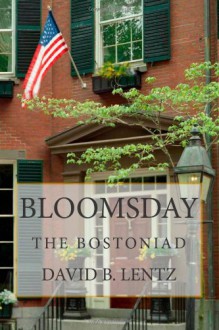June 16, 1904 is the day James Joyce famously went on the first date with his future wife, Nora Barnacle. Famously because that date later served as the setting for his novel Ulysses, that bastion of modern--and Modern--literature that has challenged, delighted, frustrated, alienated and inspired readers for going on 100 years now. The day itself has grown to the status of a cult holiday, celebrated by a very specific set of book nerds around the world.
The Sixteenth of June by Maya Lang is, naturally, set on June 16, 2004, the celebration of 100 years since the story of Ulysses was set, but it is not strictly about Ulysses or Bloomsday to my great relief. For a difficult and smart book Ulysses has inspired a lot of kitsch in the Bloomsday celebrations in particular, but Lang avoids the rocks of a Bloomsday book, like Ulysses itself it is more in conversation with its source than mimicking it. The Sixteenth of June is heavily allusive in language and structure but it is also a distinct story. Lang uses the celebration and book as a launching point to explore the ways in which people interact with literature: as an academic exercise, as an escape as a way of understanding the world and ourselves, and sometimes just as a badge.
We follow three people in alternating chapters. Nora, a singer trained in opera but performing at a jazz lounge, is in an extended mourning over the death of her mother and dealing with the pressure of being engaged. Leopold is her fiancee and his brother Stephen is Nora's best friend.
The men reflect the personalities of their counterparts in Joyce. Leopold is domestic, workmanlike in his taste and outlook. Stephen is thoughtful and paralyzed by doubt. Nora escapes such caricature, which may be why she inherited the name of the real Nora instead of the invented Molly. Leo is ready for marriage. Stephen is not ready for anything and is worried about Nora's settling. Commitment, vocation, grief, all the keystones of a good quarter-life crisis.
It took me a few days to warm to the book. The first chapters are packed with allusions to Ulysses. It reminded me of online fan fictions where every popular trope and reference is crammed into the first paragraph, as if audiences will turn away if we don't see a crossed mirror and razor blade in the first 20 pages. The names might have pushed it over the top. I GET IT! Once I got over the names and things settled into a more reasonable pace the references were more clever and fit more naturally into the story and the story itself was able to stand on its own.
The friend who gave it to me never read Ulysses so you don't have to be a Joyce fan to enjoy The Sixteenth of June, but it helps. It is a clever novel, and much less intimidating than its inspiration. It is more enjoyable than groundbreaking. It is like fan fiction in its appeal but Lang has found a way to engage with her literary forebears without resorting to cheesy mimicry. If you don't get too pretentious about your fandom, and, yes, favorite books are a type of fandom, you should enjoy the way she brings Joyce's work into the 21st century. You may also want to go back and dive into Ulysses again and I am glad for any work encouraging that.

 Log in with Facebook
Log in with Facebook 








